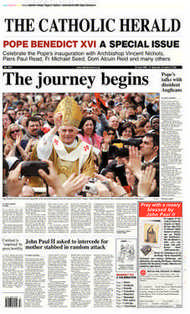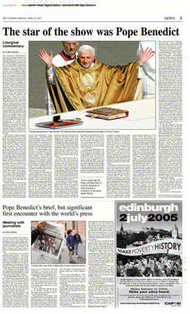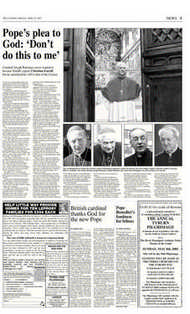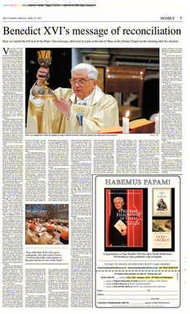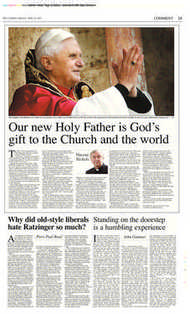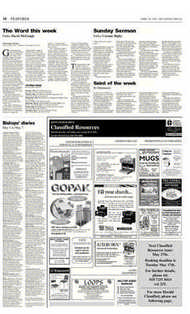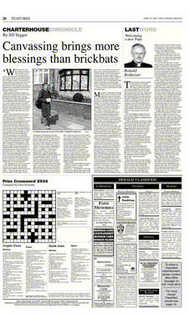Page 10, 29th April 2005
Page 10
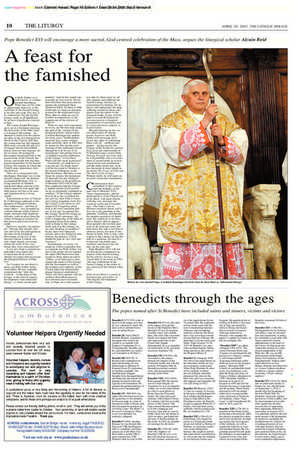
Report an error
Noticed an error on this page?If you've noticed an error in this article please click here to report it.
Tags
Share
Related articles
Benedict Xvi's Mission To Restore
The Liturgy And The People
1 Liturgy
Why The English Of The Liturgy Is Simply Not Yet Good Enough
My Vision Of How We Can Now Enrich The English Of The Mass
A feast for the famished
Our Holy Father, as is well known, is a distinguished theologian. What may not be widely appreciated, however, is the centrality of the Sacred Liturgy to his life and work. Nor may it be understood why the Sacred Liturgy shall, in all likelihood, be an area of particular concern to him.
The young Joseph Ratzinger grew up in a Germany enjoying the first fruits of the 20th century Liturgical Movement – an attempt to rediscover the spiritual value of the rich liturgical tradition of the Church. And that, the young man did. His memoir, Milestones, records the gift of a bi-lingual missal that enabled him to discover this treasure. As for so many, the Liturgical Movement introduced him to the prayer book of the Church, the missal, and taught him the theological importance of the Sacred Liturgy: the manner in which the Church prays determines what she believes.
Thus, as a young priest and theologian, Ratzinger saw in the Sacred Liturgy not “an abstract sacramental theology” but “a living network of tradition which had taken concrete form, which cannot be torn apart into little pieces, but has to be seen and experienced as a living whole”.
A prominent peritus at Vatican II, Fr Ratzinger enthused at the prospect of liturgical reform. This enthusiasm – and that of many others – was grounded in a desire that the whole Church might, through some moderate reforms, come to draw from the riches of liturgical tradition he had known and loved from his youth.
However, recently, he lamented: “Anyone like myself, who was moved by this perception in the time of the Liturgical Movement on the eve of the Second Vatican Council, can only stand, deeply sorrowing, before the ruins of the very things they were concerned for.” Is our new Pope a staunch traditionalist who rejects the Council and all its works? Should we expect him to reverse the liturgical reforms of Paul VI?
As I suspect we are about to learn, our Holy Father defies such labels. He has, certainly, complained that “after the Council... in the place of the Liturgy as the fruit of organic development came fabricated liturgy”, a “banal on-the-spot product”. And he has stated categorically in God and the World and elsewhere that proscriptions against the traditional Mass should be lifted. So there is little doubt that we shall see freedom granted to the traditional Latin Mass. But we shall not see its forcible re-imposition, or the suppression of the reforms of Paul VI.
What we may well experience, however, are the first steps along the path of the “reform of the liturgical reform” about which Cardinal Ratzinger has spoken for many years. Traditionalists need not fear, as the cardinal made perfectly clear in 2001 that he means by this not the modernising of the traditional missal (though he is in favour of its enrichment), but getting back to “a faithful ecclesial celebration of the Liturgy” everywhere. What will that mean in practice?
Concretely, we shall have to wait and see. No doubt much will be discussed in October at the Synod of Bishops on the Holy Eucharist. But there is one thing for certain, the fundamental principle for any liturgical improvements in the pontificate of Benedict XVI will be that they emphasise that the Liturgy is indeed sacred, God-centred. As he so eloquently explained as cardinal: “If the Liturgy appears first of all as the workshop for our activity, then what is essential is being forgotten: God. For the Liturgy is not about us, but about God. Forgetting about God is the most imminent danger of our age. As against this, the Liturgy should be setting up a sign of God’s presence. Yet what is happening, if the habit of forgetting about God makes itself at home in the Liturgy itself, and if in the Liturgy we are only thinking of ourselves? In any and every liturgical reform, and every liturgical celebration, the primacy of God should be kept in view first and foremost.” Immediately, of course, we might do well to remember that as cardinal, our Holy Father was one of the prime movers behind the April 2004 Instruction that sought to bring about an end to “abuses, even quite grave ones, against the nature of the Liturgy and the Sacraments as well as the tradition and authority of the Church [that] not infrequently plague liturgical celebrations”. Those who have spoken with the cardinal about Redemptionis Sacramentum have no doubt that, as Pope, he would require not only its observance by all who prepare and celebrate the Sacred Liturgy, but also its enforcement by bishops, for he knows and appreciates the deep suffering caused by those who depart from the norms of the liturgical books. It may well be time to re-read Redemptionis Sacramentum as a liturgical examination of conscience and to correct practices contrary to its provisions.
Beyond insisting on the correct observance of current norms, however, our Holy Father will encourage us to revisit the value of celebrating Mass with all – celebrant and people – facing east for the Liturgy of the Eucharist, particularly given his endorsement of Fr Michael Lang’s recent book Turning Towards the Lord. And he will probably seek a re-evaluation of recent trends in ecclesiastical music and architecture and the other sacred arts, as he has discussed at some length in his books The Feast of Faith and The Spirit of the Liturgy. Without doubt, he will insist on accurate vernacular translations.
Commentators have remarked on the courtesy and the humility of the man who is Benedict XVI. Those characteristics, and his profound love of the Church and of his flock, will mean that he will take very seriously the words he wrote not 12 months ago: “The Pope is not an absolute monarch whose will is law, but is the guardian of the authentic Tradition, and thereby the premier guarantor of obedience. He cannot do as he likes, and is thereby able to oppose those people who for their part want to do what has come into their head. His rule is not that of arbitrary power, but that of obedience in faith. That is why, with respect to the Liturgy, he has the task of a gardener, not that of a technician who builds new machines and throws the old ones on the junk pile.” Pope Benedict XVI will not act beyond his competence in respect of the Sacred Liturgy, but he will act, for he is convinced that, as he wrote in 1997, “the true celebration of the Sacred Liturgy is the centre of any renewal of the Church whatever”.
blog comments powered by Disqus


